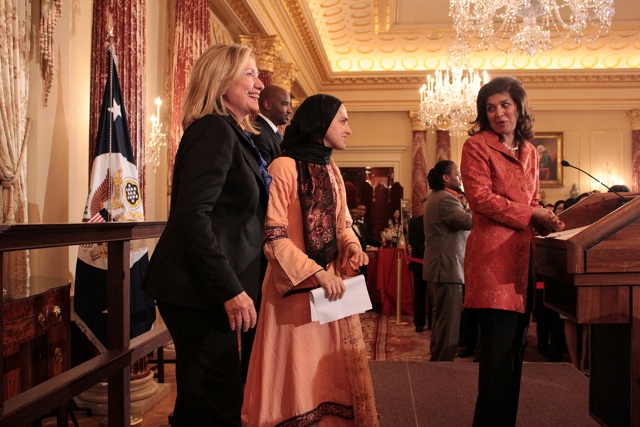An article by Umar Weswala who writes at My Choice is Peace. He is based in Uganda. He also runs and writes at The Community Agenda. He interviewed me and wrote about my attendance at the State Eid al Fitr Reception. Below is a copy of the article:
Meet Kulsoom Abdallah, an American Muslim Woman with Islam at Heart
 |
| Kulsoom in action |
Kulsoom Abdullah is an American Muslim born and raised in the United States. In her teens she chose to start wearing the Hijab inline with her Muslim faith, an expression of modesty and dignity in Islam.
While she was in graduate school at Georgia Tech, getting a PhD in computer networking, she reached the black belt level in taekwondo, the Korean martial art. She started lifting weights about four years ago as part of her overall training regimen. It turned into a passion.
Kulsoom whose parents are originally from Pakistan is now a weight lifter and she recently made history by becoming the first woman to compete in the U.S. championships while wearing Hijab (clothing that covers her legs, arms and hair).
 |
| Kulsoom with Sec. Clinton (L) and Farah Pandith (R) |
She had earlier been denied the opportunity to compete while in Hijab because according to the USA Weightlifting, the sport’s national governing body, her dress code did not adhere to the International Weightlifting Federation regulations.
The rules required that arms and legs of a competitor be bare so judges can see when elbows and knees are “locked” to determine if a lift is successful. Most competitors wear a form-fitting body suit with short sleeves and short pants called a singlet.
Kulsoom decided to take her case to the IWF with a 43-page presentation detailing clothing options that would meet her Muslim modesty requirements, allow competition officials to make clear calls and avoid concerns that she was obtaining any competitive advantage.
She was cleared to compete in accordance with her Muslim faith after the International Weightlifting Federation ruled that athletes could wear a full-body “unitard” under the customary weightlifting uniform.
Kulsoom was among the international Muslim athletes recently hosted by the United States Secretary of State at the State Department for a reception marking Eid el Fitri.
Kulsoom gave a speech during the reception which was also attended by Farah Pandith, the special representative to the muslim communities at the Department of State. The athletes included Ephraim Mateen Salaam – an American football Offensive tackle and Boxer Amir Khan among others.
Below are her responses to ‘five questions’ about her life that I put to her her;
How has Islam inspired you in the course of pursuing your career?
I think because in Islam we are encouraged to seek knowledge and use that to teach others and help the community that is part of the reason I tried to get as much education as I could. Since I like school, academia and research in general, I decided to pursue a PhD.
What challenges have you faced as a Muslim; are they the same as those you faced 10 years ago or they have changed?
I think they are mostly the same. I dress the same way as I did then as I do now, so I am more identified by others as a Muslim. But I think more people know about Islam, whether from an accurate or inaccurate source, there is more understanding. I am hopeful that there will be fewer misconceptions, ignorance and more tolerance.
 |
| Kulsoom displays a medal she won |
How did you feel when you won the right to compete while in ‘Hijab’?
I was surprised the decision happened so quickly, and I was happy when I found out. That left me only 2 weeks to get ready for the upcoming national competition, but I knew I had to go. So many people and the media supported me.
It also makes me hopeful other sporting bodies will want to include allowance for modest attire, and I hope that it encourages more women to get involved in sports.
What is your personal view on state of Islam in the US?
I think we are fortunate to freely practice and have the right to religious freedom. It is not perfect, and there are challenges, but I think with the rights we have, we can speak up about it and encourage changes in government, policy and in private sectors.
Any community activities you may be involved in?
Unfortunately, I wish I was involved in more, but I am not. When the media knew of my story and I have been fortunate to be given the platform to continue to share it, I have been occupied with that, plus training and competitions. I do hope and have some upcoming plans to speak at various events, and be on speaking panels, so I hope from this; I will become more involved in community activities. One area I anticipate is women involvement in sports and in my own academic research I am interested in topics that have a humanitarian basis.
Posted 19th October 2011 by Umar Weswala

